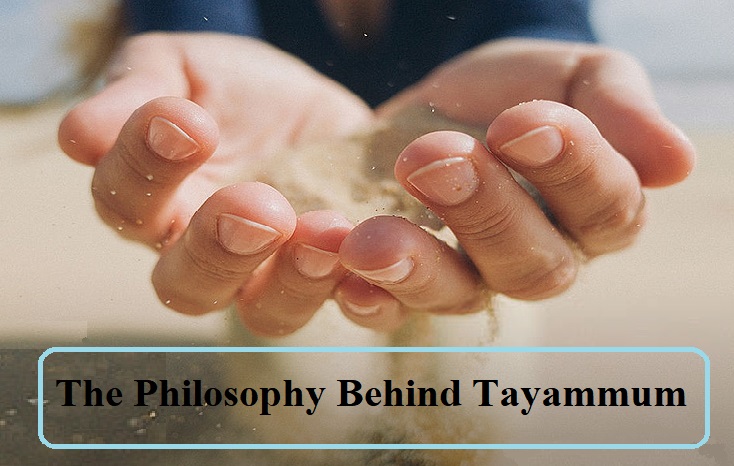Numerous people question as to what benefit could the hitting of hands upon the earth and then wiping them over the forehead and the back of the hands possibly possess, especially in the light of our knowledge that very many kinds of soil are dirty, polluted and a medium for the transfer of microbes?
In answering such objections, attention ought to be paid to two points:
1. The Ethical Benefit
Tayammum is one of the acts of worship in which the ‘soul’ of worship - in the true meaning of the word - becomes manifest. This is because man wipes his forehead, which is the most honourable portion of his body, by means of his hands that have been struck upon the earth in order to exhibit his humbleness and humility towards his Lord as if to say:
My forehead and my hands are totally humble and subservient in Your presence - after which, he proceeds to engage himself in prayers or other acts of worship that require Wudu or ghusl. This, in itself, has a great effect in developing within the people a spirit of humility, subservience and thanksgiving.
2. The Sanitary Benefit
Today, it has been established that soil, due to its containing numerous bacteria, is able to do away with contamination and pollution. These bacteria, whose work is to decompose organic substances and eliminate various kinds of infections, are generally located, in numerous numbers, on the surface of the earth or at less depths, where they are better able to benefit from the air and sunlight.
It is for this reason that an animal carcass or a human body -when buried after death, and similarly polluted matter that is on the surface of the earth - get decomposed in a comparatively short period, and in the face of bacterial attack, the infection gets destroyed. Surely, if the soil were not to have possessed such a characteristic, the entire planet, in a short period, would have transformed into a centre of infection.
Essentially, soil possesses a property that is similar to an antibiotic and is extraordinarily effective in eliminating microbes. Thus, pure soil is not only uncontaminated but instead, serves to eliminate contamination and in this respect it can, to a certain extent, be a substitute for water - the difference being that water is the dissolver, meaning that it dissolves the bacteria and carries it with itself whereas soil eliminates the microbes.
But it ought to be noted that the earth for tayammum should always be pure (Tahir), just as the Qur`an employing an interesting expression says: طَيِّبا
Interestingly, the use of the word صَعِيْد , which has been derived from the root صُعُوْد , is an allusion to the fact that it is better to use the soil lying on the surface of the ground for this purpose - the same soil, which receives the air and the sunshine, and contains the microbe-killing bacteria. If such a soil also happens to be pure, then tayammum by means of it shall possess the above benefits without carrying the slightest of detriment.
Source:
180 Questions Enquiries About Islam
[Volume One: The Practical Laws, P: 19-21].
Ayatullah al-`Uzma al-Hajj ash-Shaykh Nasir Makarim Shirazi
The Islamic Education Board of the World Federation of Khoja Shia Ithna-Asheri Muslim Communities.

